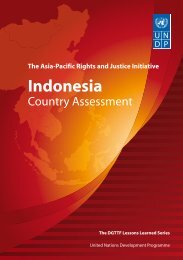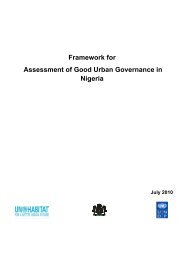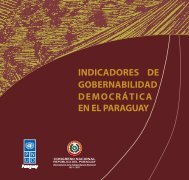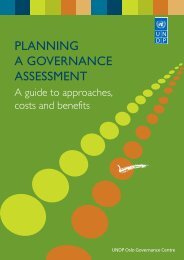A Users' Guide to Measuring Local Governance
A Users' Guide to Measuring Local Governance
A Users' Guide to Measuring Local Governance
You also want an ePaper? Increase the reach of your titles
YUMPU automatically turns print PDFs into web optimized ePapers that Google loves.
5<br />
Indica<strong>to</strong>rs of <strong>Local</strong> Democratic <strong>Governance</strong><br />
Producer<br />
<strong>Local</strong> Government and Public Service Reform<br />
Initiative of the Open Society Institute, in partnership<br />
with the Tocqueville Research Center<br />
His<strong>to</strong>ry<br />
The <strong>Local</strong> Government and Public Service Reform<br />
Initiative (LGI), and the Tocqueville Research Center<br />
(T-RC), Budapest initiated a project titled<br />
“Indica<strong>to</strong>rs of <strong>Local</strong> Democratic <strong>Governance</strong>” in<br />
2000. The project aims <strong>to</strong> help decision-makers<br />
and researchers <strong>to</strong> assess and explain the state of<br />
local democracy in the countries of Central and<br />
Eastern Europe, which have adopted new local<br />
government structures since the fall of communism<br />
in 1989-90.<br />
Objectives<br />
The Project aims <strong>to</strong> help decision-makers and<br />
researchers assess and explain local government<br />
performance.The overarching goal of the Project is<br />
<strong>to</strong> develop a set of operational, flexible, and<br />
adaptable indica<strong>to</strong>rs based on internationally<br />
recognized definitions of local democracy and<br />
governance. It is a moni<strong>to</strong>ring programme that<br />
offers comprehensive, longitudinal and crossnationally<br />
comparable information on local<br />
democratic governance in Central and Eastern<br />
Europe. Specifically, the Project aims <strong>to</strong>:<br />
• generate original survey data and collect other<br />
relevant statistical data;<br />
• regularly report on the state of local democracy<br />
in Central and Eastern Europe;<br />
• disseminate results and standardized datasets<br />
<strong>to</strong> inform developmental and policy reform<br />
initiatives.<br />
Applicability<br />
The Indica<strong>to</strong>rs of <strong>Local</strong> Democratic <strong>Governance</strong><br />
have mainly been developed for use by countries<br />
of Central and Eastern Europe, but can in fact be<br />
used by any country in transition.They can be used<br />
<strong>to</strong> compare the progress of local democratic<br />
governance within the same country, or amongst<br />
different countries.<br />
Types and sources of data used<br />
Data are collected using three types of surveys,<br />
which use both objective and subjective information:<br />
the <strong>Local</strong> Government Survey (LGS), the <strong>Local</strong><br />
Representative Survey (LRS), and the citizen survey.<br />
The questionnaires were developed on the basis of<br />
the paper “The Indica<strong>to</strong>rs of <strong>Local</strong> Democratic<br />
<strong>Governance</strong> Project: Concepts and Hypothesis”<br />
(see supplementary <strong>to</strong>ols/guidelines).<br />
The LGS collects factual information about the<br />
activities of local government and the organisation<br />
of civil society. The survey includes questions<br />
related <strong>to</strong> the administrative staff, the budget, the<br />
decision-making process, polices, democratic<br />
activities and local governments, local parties, local<br />
civil society, local media, local social life, etc. The<br />
LRS survey focuses on elected representatives’<br />
perceptions on local government performance. It<br />
provides an assessment of the relationship<br />
between local government and the citizens. The<br />
LRS investigates relations of trust and power<br />
within the political elite, party and NGO<br />
membership, as well as the respect of democratic<br />
values. The citizen survey address almost all issues<br />
examined in the two other surveys.<br />
Methodology<br />
The project uses a wide variety of variables<br />
<strong>to</strong> gauge the variance of local governance<br />
performance on the one hand, and its roots in<br />
economic, political, legal, cultural and social fac<strong>to</strong>rs<br />
on the other:<br />
74 UNDP Oslo <strong>Governance</strong> Centre




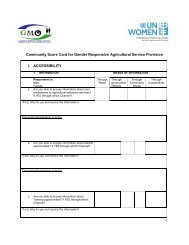

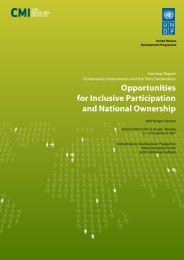
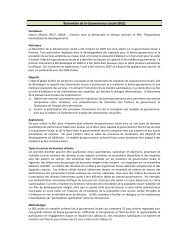
![GuÃa del Usuario ] - Governance Assessment Portal](https://img.yumpu.com/44740603/1/190x253/gua-a-del-usuario-governance-assessment-portal.jpg?quality=85)
